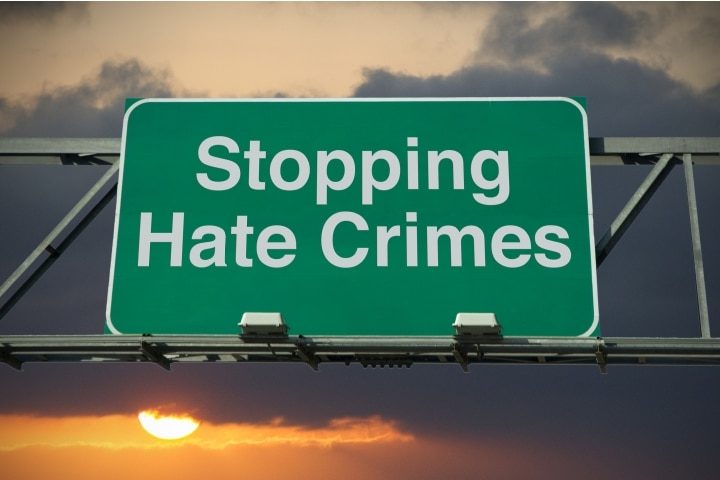
Many American statists have long desired European-like “hate speech” law, which can be used to stifle anti-establishment dissent. A bill that recently passed the Michigan House of Representatives could deliver just that, too, as it would punish threatening actions — and determine what’s “threatening” based on the “victim’s” feelings, according to The Epoch Times. In an age in which are heard complaints about “microaggressions” and that even “silence is violence,” you can only imagine how such a law could be (ab)used.
As the Times reports:
A bill moving through the Democrat-controlled Michigan State Legislature would make it easier for prosecutors to bring felonious “hate crime” charges against dissident speech.
…The proposed legislation, HB 4474, would amend the state’s Ethnic Intimidation Act of 1988 in order to consider it a hate crime if a person is accused of causing “severe mental anguish” to another individual by means of perceived verbal intimidation or harassment.
The amendment defines the words intimidate or harass as a “willful course of conduct, involving repeated or continuing harassment of another individual that would cause a reasonable individual to feel terrorized, frightened, intimidated, threatened, harassed, or molested…”
“Words are malleable,” Attorney David Kallman of the Great Lakes Justice Center (GLJC), a non-profit legal organization dedicated to preserving liberty in America, told The Epoch Times. “They can be redefined by whoever is in power.”
“Under the proposed statute, ‘intimidate and harass’ can mean whatever the victim, or the authorities, want them to mean. The focus is on how the victim feels rather than on a clearly defined criminal act. This is a ridiculously vague and subjective standard,” he said.
“The absence of intent makes no difference under this law. You are still guilty of the crime because the victim felt uncomfortable.
This makes a mockery of law. That is, we hear much about how the United States is meant to be a “nation of laws.” Being that in spirit and not just name, however, requires that our laws not be lawless, in the sense of having no basis in the ultimate law: the objective — Truth.
Yet laws whose effectuation is dependent upon how an alleged victim feels, or how a prosecutor feels about how a plaintiff feels, are by definition subjective.
As to what kind of subjectivity we’d be subject to, The American Spectator relates that the bill is ostensibly meant to combat “anti-LGBTQ violence” and then makes an important point:
It seeks to protect a demographic that disproportionately lends itself to mental illnesses that distort one’s perception of reality, including depression, anxiety, and narcissistic personality disorder.
People who identify as LGBTQ report higher rates of depression and anxiety than non-LGBTQ people. One study also found that homosexuality in males and narcissism are highly correlated.
Both narcissists and people diagnosed with anxiety and depression do not tend to take well to any level of criticism. People with narcissistic personality disorder tend to find criticism incredibly threatening — as do those suffering from anxiety or depression.
This bill tramples the First Amendment while catering to groups with a strong tendency to exaggerate the criticism they face.
This factor is significant. Some studies show that narcissistic personality disorder afflicts MUSS (Made-up Sexual Status, aka, “transgender”) individuals in particular, and as the Mayo Clinic informs, true narcissists “have an unreasonably high sense of their own importance … need and seek too much attention and want people to admire them … and are easily upset by the slightest criticism.”
What’s more, it appears ours is an age that breeds more narcissists than ever, perhaps due to permissive, pander-bear parenting that treats still uncivilized babes like coddled royalty. Ergo the phenomenon of snowflakes retreating to “safe spaces” — where criticism is forbidden.
Yet as disastrous as it is making damaged people’s emotions the arbiters of criminal reality, it also may be a feature and not a bug. After all, nothing “threatens a ruling class like free speech. Free speech points out policy failures, corruption, stupidity, and all sorts of other things that tyrants must hide to maintain their hold on power,” points out commentator Andrea Widburg.
This said, leftist legislators focus as they do on feelings because, being leftists, they themselves are emotion-driven. Consequently, they wouldn’t necessarily need a well-calculated agenda to enact a de facto hate-speech law; that they hate certain commentary is for them enough justification to label it hate and criminalize it.
And for certain is that the alleged motivation for HB 4474 — rising anti-sexual devolutionary violence — is based on illusion. Not only is evidence of such a spike unproven but, insofar as MUSS individuals go, they actually commit an inordinate amount of murder and sex crime.
It should also be noted that to combat violence, you stiffen penalties for violence, an act — you don’t criminalize speech under the pretext that “it could lead to violence.”
What has lead to violence, though, against the American system and spirit, is already existing hate-crime law. As I’ve long warned, accepting the criminalization of adults’ speech within any context (i.e., during the commission of a crime) brings us closer to the criminalization of it within every context.
Thus should conservatives not just fight the expansion of hate-crime law, but seek its rescission with the valid rallying cry that it represents Big Brother thought control. It shouldn’t be hard, either, resisting lectures about speech’s “dangerousness” from people who believe in revolving-door justice for smash-and-grab criminals and that rioting is “expression.”



